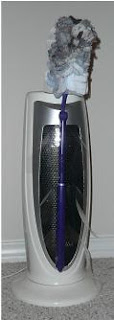 | A feather-duster attached to a space heater covertly submitted by GAO investigators as a “Room Air Cleaner” had an “Energy Star” designation approved by the EPA. Issa and Barrasso Ask EPA to Account for Outrageous “Energy Star” Approvals; Ask How EPA Will Catch Fraud in a Carbon Offset Program WASHINGTON D.C. – House Oversight and Government Reform Committee Ranking Member Darrell Issa and Senate Environment and Public Works, Subcommittee on Oversight Ranking Member John Barrasso today asked Environmental Protection Agency (EPA) Administrator Lisa Jackson to account for outrageous failings of the Energy Star Program discovered by the Government Accountability Office (GAO). |
“If EPA can be punked with a space heater and feather duster, how does it expect to police carbon-offsets under cap-and-trade?” asked Rep. Issa. “Expanding EPA’s responsibilities under cap-and-trade will lead to massive fraud, kill American jobs, and devastate our economy.”
According to Senator Barrasso, “Once again, independent federal watchdogs have discovered more waste and abuse at the EPA. The recent GAO report makes the Energy Star Program seem like an Energy Fraud Program. If the EPA can’t effectively manage the Energy Star Program, how will the agency be able to successfully implement a complicated cap and trade program? Our letter today calls upon the EPA to clearly explain its inability to protect American taxpayer dollars. We need more jobs in this country – not more government waste and inefficient bureaucracies.”
The Energy Star program was introduced by the U.S. Environmental Protection Agency in 1992, under the authority of the Clean Air Act, as a voluntary labeling program designed to promote energy efficient computers and monitors. Through expansions the label is now found on over 60 product categories including residential heating, ventilation, and cooling (HVAC) equipment, major appliances, office equipment, lighting, home electronics, new homes, and commercial and industrial buildings, with a reported energy-efficiency savings of up to 10 to 25 percent over the minimum federal standards. GAO tested the program for susceptibility to fraud by submitting qualified product information (QPI) forms and efficiency information via the Online Product Submittal (OPS) tool for 20 bogus products. Of the products submitted, 15 (including the “Air Room Cleaner”) were approved, 2 were denied Energy Star qualification, and 3 products were voluntarily removed by GAO because it had not received an official qualification determination by the time our investigation was completed.
the letter Rep. Issa and Sen. Barrasso sent to Administrator Jackson in PDF format.
GAO Energy Star report in PDF format.










